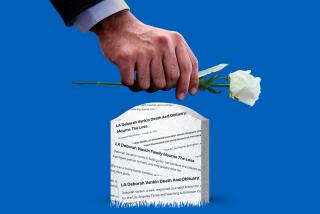Some Make Internet’s Promise a Web of Lies
- Share via
For two days last week, my older brother, Donnie, was missing in New York City. An early riser on vacation, he thought the top of the World Trade Center seemed the perfect place to start a clear summer morning.
I was thrilled to hear CNN report that Web sites had been put up to help survivors find missing loved ones. Here was a job only the Internet could do. Finally, it would prove itself priceless to all, helping a million desperate people from across the country get up-to-the-minute dispatches on who had survived or died.
But shortly after they were set up, many of the Web sites were shut down because they had been assaulted by dark souls falsely inserting names of the missing onto hospital lists, with heartbreaking consequences for their families.
Like our national security, the Internet--the miracle of our era--failed a great test. The United States and the Internet share a disconcerting truth: The democratic attributes that make both so wonderful also make them so vulnerable.
Newspapers and television networks are, by comparison, “closed societies.” It would take immense resources to, say, falsify a casualty list printed in The Times. But the Internet has few such barriers, and the events of last week have forced us to face a crisis of freedom with the Internet.
How do we keep the Internet’s vibrant, all-are-welcome accessibility yet maintain its integrity? Do we require FCC licenses of Web programmers? Burden surfers with endless “Members Only” signs online? Beat back hackers with mandatory jail time? Arm local law enforcement with a program like the FBI’s Carnivore, which can read e-mail and a home PC’s contents at will? How do we make the Internet a resource we can trust when it is most needed?
It is Americans, with our Wild West spirit, who made the Internet what it is. But total freedom means total risk. The Internet is the greatest invention of our age. It’s also the best thing that ever happened to racists, terrorists and common thieves.
In the end, it was a closed system that helped us discover my brother’s fate. My sisters frantically phoned his bank and asked whether he had used his ATM card in the last couple of days. The bank huffily refused to help before someone with a heart called back and whispered, “My computer says he used his card in Connecticut this morning.”
A few minutes later, Donnie himself called. The lines at Manhattan pay phones had been long, and he knew there were others who needed them far more than he.
*
Dan Sanders is a freelance writer.




